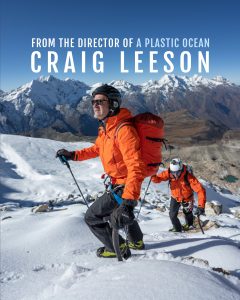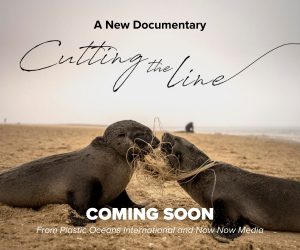“It’s not the planet that needs saving, it’s us.” – Craig Leeson
The award-winning filmmaker, Craig Leeson, who brought us A Plastic Ocean, and serves as our Plastic Oceans International Global Evangelist, continues to raise awareness of the human impact on the planet.
His highly-anticipated documentary, The Last Glaciers, will hit select IMAX screens on March 22, 2022. Made with producer, Malcolm Wood (POI Global Advisor), and executive producer, William Pfeiffer (POI Board President), it will immerse viewers in the cause and effects of climate change over an epic four-year stretch across Antarctica, the Himalaya, The French Alps, Andes and more.
The Last Glaciers is Craig’s journey to discover the loss of glacial ice and the impact of climate change while highlighting his extreme personal risk with para-alpinism and the similarities to the extreme danger our planet currently faces. The film strives to convey an optimism about combating climate change while continuing the conversation and motivating individuals to make a difference.
Leeson’s new film highlights the need for systemic change. Without a doubt, global warming is the greatest threat to our planet, but it does exacerbate other human-caused threats like plastic pollution. And vice versa. We can no longer afford to solve problems in isolation — we cannot fix only one part of the system without fixing the whole.
A recent landmark study led by conservation and science charity Zoological Society of London, was published on Wednesday September 22, 2021, in the Journal of Applied Ecology, reporting that plastic pollution and climate change are tightly interconnected where their negative impacts on biodiversity, ecosystems and marine life amplify each other.
Plastic production contributes to greenhouse gas emissions, while climate change-related extreme weather such as fires, floods and typhoons will disperse and drastically worsen environmental plastic pollution.
According to Professor Heather Koldewey, from the Zoological Society of London, “The compounding impact of both crises just exacerbates the problem. It’s not a case of debating which issue is most important, it’s recognising that the two crises are interconnected and require joint solutions.”
With Leeson’s new film, The Last Glaciers, he raises awareness about the catastrophic issues humanity faces and the need for whole-systemic-approach solutions.
When Craig Leeson was asked, “How do you convince people to save our planet?” He replied:
“It’s not the planet that needs saving, it’s us. We had a NASA scientist who travelled with us across Antarctica, who said to me in the film that the Earth will survive, but whether humans will be around to enjoy it is another matter. That’s a very profound point. We’re just a blip in the development of the planet and other species on it. What we are doing to our planet is what we are doing to ourselves. If we don’t maintain the life-support systems that we need as a species, then we won’t survive. There are many scientists who think we don’t have the capability to protect the environment enough to survive, that the decline of humanity is such a rate that our species will not endure. In my lifetime, 60% of all species on Earth have been wiped out. That is an incredible amount of biodiversity gone – and that is biodiversity we rely on for our own survival. Given that, it is not that difficult to imagine us as the species wiped out by our own mismanagement.”
When asked “Are you hopeful that we can change?”

Stay tuned for more news about The Last Glaciers and our own new film projects Against the Current, Cutting the Line, and The Erie Situation. And always feel free to visit our film library, where you can always access over a dozen educational films for free. If you have kids, Earth’s Ekko is an ideal teaching tool for ages 5 to 13, and even comes with an education guide and coloring book at no cost.


